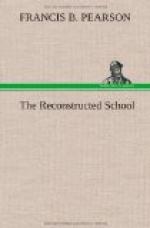In striking contrast is the man whose sphere of life is large, whose spirit is capable of reacting to the orient and the occident, to height and depth, and whose mind flashes across the space from the dawn to the sunset, and from nadir to zenith. Space is his playground, and his companions are the stars. Such a man feels and knows more life in an hour than his antithesis could feel and know in a century. To his spirit there are no metes and bounds; it has freedom and strength to make excursions to the far limits of space and time. Life comes to him from a thousand sources and in a thousand ways because he is able to go out to meet it. There has been developed in him a sensory foundation by which he can react to every influence the universe affords, to light and shadow, to joy and sorrow, to the near and the far, to the then and the now, to the lowly and the sublime, and to the finite and the Infinite. He has a big spirit, which is first in command; he has a strong, active mind, which is second in command; and he has a loyal company of bodily organs that are able and willing to obey and execute commands.
To such a man we apply all the epithets of compliment and commendation which the language yields and cite him as an exemplification of life at high tide, of life in its supreme fullness and splendor. The knowledge of the world comes to his doors to do his bidding; before him the arts and sciences make their obeisance; and wisdom is his pillar of cloud by day and his pillar of fire by night. Therefore we call him educated; we call him a man of culture; we call him a gentleman; and all because he has achieved life in abundant measure. Having imagination, he is able to peer into the future, anticipate world movements, and visualize the paths on which progress will travel. Having initiative as his badge of leadership, he is able to rally hosts of men to his standard to execute his behests for civic, national, and world betterment. Having aspiration, he obeys the divine urge within him and moves onward and upward, eager to plant the flag of progress upon the summit that others may see and be stimulated to renewed hope and courage.




